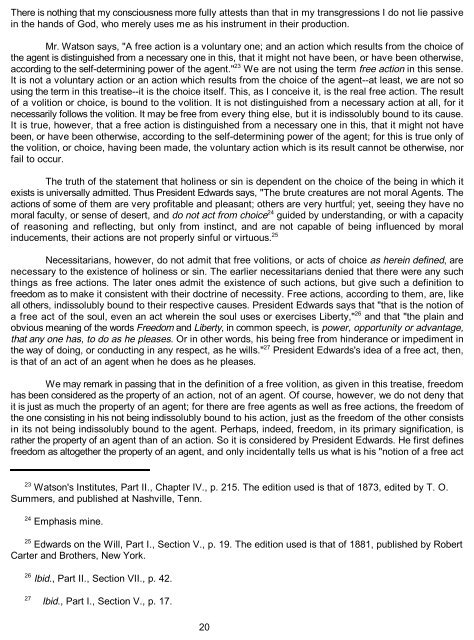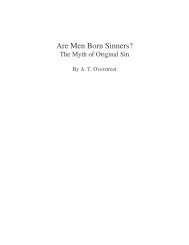Foreknowledge by Joel Hayes - Library of Theology
Foreknowledge by Joel Hayes - Library of Theology
Foreknowledge by Joel Hayes - Library of Theology
You also want an ePaper? Increase the reach of your titles
YUMPU automatically turns print PDFs into web optimized ePapers that Google loves.
There is nothing that my consciousness more fully attests than that in my transgressions I do not lie passive<br />
in the hands <strong>of</strong> God, who merely uses me as his instrument in their production.<br />
Mr. Watson says, "A free action is a voluntary one; and an action which results from the choice <strong>of</strong><br />
the agent is distinguished from a necessary one in this, that it might not have been, or have been otherwise,<br />
23<br />
according to the self-determining power <strong>of</strong> the agent." We are not using the term free action in this sense.<br />
It is not a voluntary action or an action which results from the choice <strong>of</strong> the agent--at least, we are not so<br />
using the term in this treatise--it is the choice itself. This, as I conceive it, is the real free action. The result<br />
<strong>of</strong> a volition or choice, is bound to the volition. It is not distinguished from a necessary action at all, for it<br />
necessarily follows the volition. It may be free from every thing else, but it is indissolubly bound to its cause.<br />
It is true, however, that a free action is distinguished from a necessary one in this, that it might not have<br />
been, or have been otherwise, according to the self-determining power <strong>of</strong> the agent; for this is true only <strong>of</strong><br />
the volition, or choice, having been made, the voluntary action which is its result cannot be otherwise, nor<br />
fail to occur.<br />
The truth <strong>of</strong> the statement that holiness or sin is dependent on the choice <strong>of</strong> the being in which it<br />
exists is universally admitted. Thus President Edwards says, "The brute creatures are not moral Agents. The<br />
actions <strong>of</strong> some <strong>of</strong> them are very pr<strong>of</strong>itable and pleasant; others are very hurtful; yet, seeing they have no<br />
24<br />
moral faculty, or sense <strong>of</strong> desert, and do not act from choice guided <strong>by</strong> understanding, or with a capacity<br />
<strong>of</strong> reasoning and reflecting, but only from instinct, and are not capable <strong>of</strong> being influenced <strong>by</strong> moral<br />
inducements, their actions are not properly sinful or virtuous. 25<br />
Necessitarians, however, do not admit that free volitions, or acts <strong>of</strong> choice as herein defined, are<br />
necessary to the existence <strong>of</strong> holiness or sin. The earlier necessitarians denied that there were any such<br />
things as free actions. The later ones admit the existence <strong>of</strong> such actions, but give such a definition to<br />
freedom as to make it consistent with their doctrine <strong>of</strong> necessity. Free actions, according to them, are, like<br />
all others, indissolubly bound to their respective causes. President Edwards says that "that is the notion <strong>of</strong><br />
26<br />
a free act <strong>of</strong> the soul, even an act wherein the soul uses or exercises Liberty," and that "the plain and<br />
obvious meaning <strong>of</strong> the words Freedom and Liberty, in common speech, is power, opportunity or advantage,<br />
that any one has, to do as he pleases. Or in other words, his being free from hinderance or impediment in<br />
27<br />
the way <strong>of</strong> doing, or conducting in any respect, as he wills." President Edwards's idea <strong>of</strong> a free act, then,<br />
is that <strong>of</strong> an act <strong>of</strong> an agent when he does as he pleases.<br />
We may remark in passing that in the definition <strong>of</strong> a free volition, as given in this treatise, freedom<br />
has been considered as the property <strong>of</strong> an action, not <strong>of</strong> an agent. Of course, however, we do not deny that<br />
it is just as much the property <strong>of</strong> an agent; for there are free agents as well as free actions, the freedom <strong>of</strong><br />
the one consisting in his not being indissolubly bound to his action, just as the freedom <strong>of</strong> the other consists<br />
in its not being indissolubly bound to the agent. Perhaps, indeed, freedom, in its primary signification, is<br />
rather the property <strong>of</strong> an agent than <strong>of</strong> an action. So it is considered <strong>by</strong> President Edwards. He first defines<br />
freedom as altogether the property <strong>of</strong> an agent, and only incidentally tells us what is his "notion <strong>of</strong> a free act<br />
23<br />
Watson's Institutes, Part II., Chapter IV., p. 215. The edition used is that <strong>of</strong> 1873, edited <strong>by</strong> T. O.<br />
Summers, and published at Nashville, Tenn.<br />
24<br />
Emphasis mine.<br />
25<br />
Edwards on the Will, Part I., Section V., p. 19. The edition used is that <strong>of</strong> 1881, published <strong>by</strong> Robert<br />
Carter and Brothers, New York.<br />
26<br />
27<br />
Ibid., Part II., Section VII., p. 42.<br />
Ibid., Part I., Section V., p. 17.<br />
20






